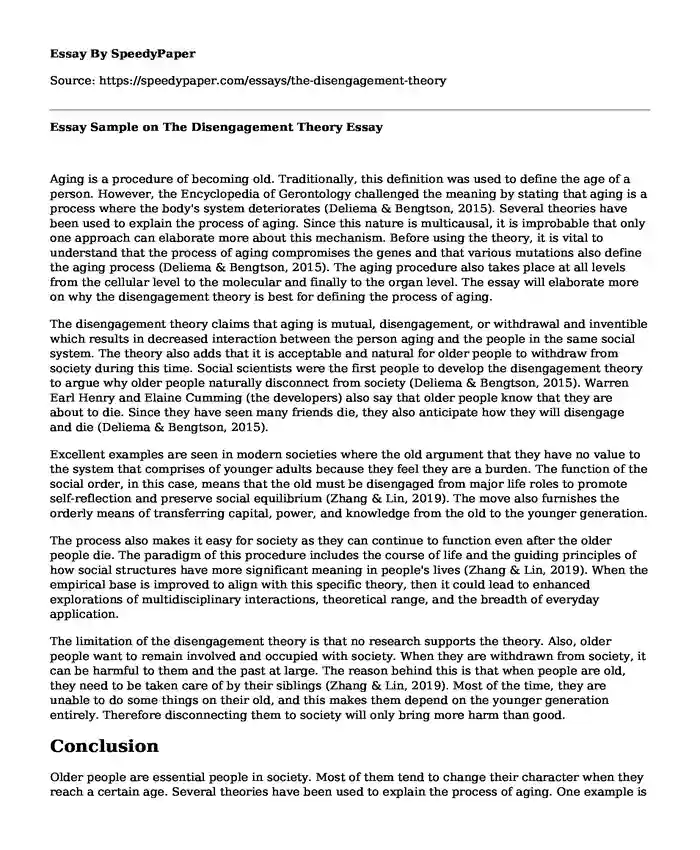
| Type of paper: | Essay |
| Categories: | Anthropology Population Anatomy Lifespan development |
| Pages: | 3 |
| Wordcount: | 646 words |
Aging is a procedure of becoming old. Traditionally, this definition was used to define the age of a person. However, the Encyclopedia of Gerontology challenged the meaning by stating that aging is a process where the body's system deteriorates (Deliema & Bengtson, 2015). Several theories have been used to explain the process of aging. Since this nature is multicausal, it is improbable that only one approach can elaborate more about this mechanism. Before using the theory, it is vital to understand that the process of aging compromises the genes and that various mutations also define the aging process (Deliema & Bengtson, 2015). The aging procedure also takes place at all levels from the cellular level to the molecular and finally to the organ level. The essay will elaborate more on why the disengagement theory is best for defining the process of aging.
The disengagement theory claims that aging is mutual, disengagement, or withdrawal and inventible which results in decreased interaction between the person aging and the people in the same social system. The theory also adds that it is acceptable and natural for older people to withdraw from society during this time. Social scientists were the first people to develop the disengagement theory to argue why older people naturally disconnect from society (Deliema & Bengtson, 2015). Warren Earl Henry and Elaine Cumming (the developers) also say that older people know that they are about to die. Since they have seen many friends die, they also anticipate how they will disengage and die (Deliema & Bengtson, 2015).
Excellent examples are seen in modern societies where the old argument that they have no value to the system that comprises of younger adults because they feel they are a burden. The function of the social order, in this case, means that the old must be disengaged from major life roles to promote self-reflection and preserve social equilibrium (Zhang & Lin, 2019). The move also furnishes the orderly means of transferring capital, power, and knowledge from the old to the younger generation.
The process also makes it easy for society as they can continue to function even after the older people die. The paradigm of this procedure includes the course of life and the guiding principles of how social structures have more significant meaning in people's lives (Zhang & Lin, 2019). When the empirical base is improved to align with this specific theory, then it could lead to enhanced explorations of multidisciplinary interactions, theoretical range, and the breadth of everyday application.
The limitation of the disengagement theory is that no research supports the theory. Also, older people want to remain involved and occupied with society. When they are withdrawn from society, it can be harmful to them and the past at large. The reason behind this is that when people are old, they need to be taken care of by their siblings (Zhang & Lin, 2019). Most of the time, they are unable to do some things on their old, and this makes them depend on the younger generation entirely. Therefore disconnecting them to society will only bring more harm than good.
Conclusion
Older people are essential people in society. Most of them tend to change their character when they reach a certain age. Several theories have been used to explain the process of aging. One example is the disengaging theory, which claims that aging is mutual, disengagement, or withdrawal and inventible that resulting in decreased interaction between the person aging and the people in the same social system. Even though the theory might be correct, the truth of the matter is that older people need to be near people.
References
Deliema, M., & Bengtson, V. L. (2015). Activity Theory, Disengagement Theory, and Successful Aging. Encyclopedia of Geropsychology, 1(1), 1-6. doi: 10.1007/978-981-287-080-3_102-1
Zhang, X., & Lin, H. (2019). Disengagement Theory. Encyclopedia of Gerontology and Population Aging, 2(2), 1-6. doi: 10.1007/978-3-319-69892-2_645-1
Cite this page
Essay Sample on The Disengagement Theory . (2023, Jul 10). Retrieved from https://speedypaper.net/essays/the-disengagement-theory
Request Removal
If you are the original author of this essay and no longer wish to have it published on the SpeedyPaper website, please click below to request its removal:
- Essay Example on Sexism in the Modern World
- Role of Race in American Foreign Policy - Essay Example
- Essay Sample: The Idea of Ideology and Race
- Paper Example - Beauveria Bassiana
- California Sexual Assault Politics, Essay Example for Free
- Free Essay on Description of the Target Population
- Free Paper Example: Politics of Immigration in the United States
Popular categories




